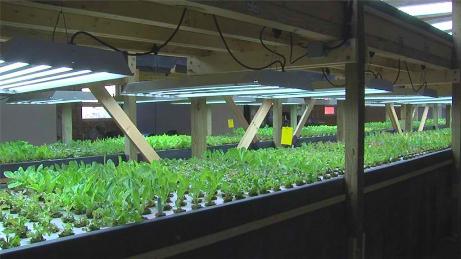What happened to the poster child aquaponics business model? Aqua Vita Farms in Sherrill, New York is now literally and officially belly up. Naturally, the non-liberal right wingers are all snickering and calling it a kettle of fish they knew was a bad idea. The same who would be complaining about the wealth not being shared if the venture had been ultra successful. Failure here appears to be something that was easily avoidable, though the handwriting on the wall was most likely not available going into this now misadventure.
The first red flag here is the size of the startup operation in such untested waters. True, there is the proverbial “run with the big dogs or stay on the porch” mantra every business owner faces, but should you accept that challenge as a pioneer? Probably not, though it works well if you’ve done your homework in a saturated with competition industry.
Not that there is no competition in the lettuce farming business. Dole and other large producers has that down pat and cheaply priced to boot. Aqua Vita, unaware they were to face a lettuce price war in their region and lose, grew the wrong crop. Quality and superior freshness was not victorious over lower prices among local merchants and restaurants.
 Lesson #1: Start small and grow as you learn what your best approach will be in your particular market. You can fail even if you have customers!
Lesson #1: Start small and grow as you learn what your best approach will be in your particular market. You can fail even if you have customers!
Don’t expect someone to be there to bail you out with investment funds. Only banks are too big to fail. All forms of hydroponic farming are too unproven to count on big pockets to rush to your rescue.
This could be a very regional thing too. The east coast and midwest have deep agricultural roots in the soil. The very persons who would normally step in to give such a startup assistance may very well be your own worst enemy. Why? You’re making waves where they’re unwelcome. Then again, many a soil farmer has failed for the very same reasons that Aqua Vita Farms did.
Lesson #2: Overwhelming equipment costs and operating costs.
The cost of retrofitting the building that houses Aqua Vita along with the equipment needed to run a two-tier aquaponics farm in 13,000 square feet is pricey to be sure. Its a lot lower than the cost of big farm equipment though that is used perhaps only one time a year.
Aqua Vita got a $20,000 grant at the beginning of this venture. Had the startup merely doubled that amount with their own funds instead of sinking $500,000 into sailing into uncharted water, they might be announcing much needed expansion this week and not equipment liquidation. This following on the heels of a plea for capital infusion just 4 weeks ago.
Lesson #3: Perhaps more than the building should have been reclaimed.
A big part of sustainability is making use of things that aren’t new, but repurposed. There’s a good bit of lumber in their setup and every board foot is new. Lumber is not cheap. One wonders how much startup capital could have been retained for future operating costs is used lumber were put to work here instead. Its not like none is available in the area. Newspaper articles from Syracuse about Aqua Vita relates that many of these vacant commercial or industrial buildings are being torn down. Where’s all that lumber and other building material going?
A comment on a news article announcing the startup brings up a very good point. Why was so much invested in retrofitting the building? Why are there no sky lights to take advantage of natural sunlight available?
Lesson #4: Thoroughly test the market for each crop to determine salability and profit margin before diving into the deep end.
A year into the business, Aqua Vita now has a better grasp on what crop is profitable and what is not. A discovery process they should have done first. If it had been, the poster child for aquaponic farming wouldn’t be closing its doors.
Its not like they had no business plan, because they did and it was a good one. The problem was that data was incomplete or non-existent because when you’re a pioneer there just isn’t much to go on. At the time of startup, Aqua Vita was one of only four such businesses in the United States.
When you fly by the seat of your pants, make sure your load is light. Crashing is better this way. The bigger the load, the harder the fall.
If you’re in New York or not too far away, there might be some good buys on some used aquaponics equipment right now. Contact Aqua Vita to inquire.
Image courtesy of Aqua Vita Farms.